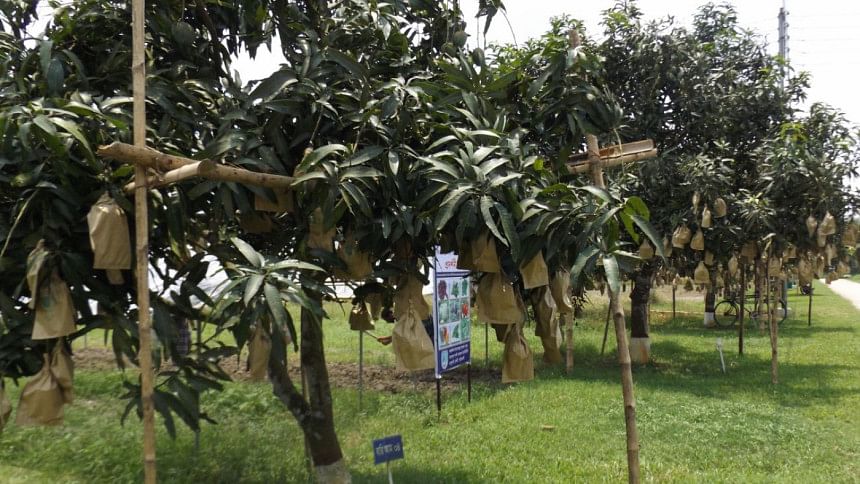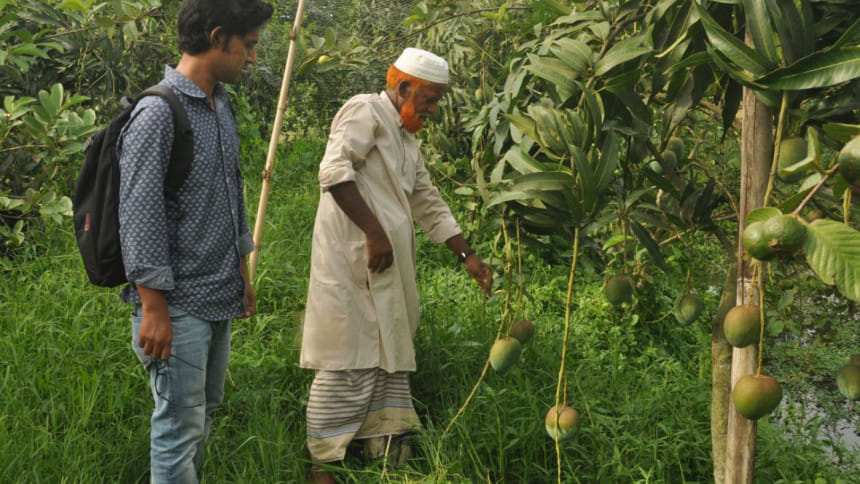Chemical-free mango farming gets popular

Chemical-free mango farming is gaining popularity in the district.
Eusuf Ali Mridha, 64, of Telikhali village in Badarpur union under Sadar upazila has become successful in growing tasty and chemical free mangoes at his orchard.
Although other farmers of the village did not take the risk of cultivating mango, damaging their paddy fields, Eusuf took the risk alone and succeeded.
Eusuf retired in 2015 as a principal officer of Sonali Bank. “I had dreamt of making an orchard of seasonal fruits after retirement as I studied soil science,” he said.
“Three years back, I set up a farm covering one acre of land with 135 mango trees,” Eusuf said.
He planted 135 mango trees of different varieties collected from Bangladesh Agricultural Research Institute (BARI) office in Lebukhali village under Dumki upazila and also from a local nursery. The trees are full of mangoes now.
Last year, he sold 50 maunds of mangoes, and he expects to sell twice as much this year, adding that he has already started selling his produce at Tk 50 per kg. His mangoes are so sweet that people come to his house to buy them, he said.
Eusuf said he uses organic fertiliser and sprays insecticides after consulting with BARI officials.
Besides mangoes, he also grows seasonal fruits like guava, litchi, malta, lemon and also seasonal vegetables all the year round.

Brothers Shahadat Hossain Nuton, 45, and Shahbaj Hossain Milton, 40, of Showla village in Baufal upazila are producing around 50 varieties of mango, including 35 foreign varieties, on around 26 acres of land on their farm Nurjahan Garden.
The brothers also grow King of Chakapat, a rare and costly variety of mango, with sapling brought from Thailand through Agricultural Institute at Khamar Bari in Dhaka three years ago at a cost of Tk 10,000.
The siblings also grow many other foreign varieties, including Mango Banana that looks like a banana, Totapuri that looks like the beak of a parrot, Mastrostota that looks like the leg of an elephant, Apple that looks like an apple and Surjodim as it looks like a setting sun.
“Many farmers have started cultivating mango to meet family demand and also benefit financially,” said BARI Scientific Officer Md Rezaul Karim.
“We have started a programme to train growers on modern methods of farming mango. Forty farmers took part in the 1st batch training workshop held on May 30,” he said.
“We have been distributing 3,000 to 3,500 mango saplings among local growers every year from 2013,” he added.
“Newly introduced BARI-11 mango is getting popular among local growers as it bears fruit thrice a year,” said BARI Principal Scientific Officer Dr Babul Chandra Sarker.





Comments